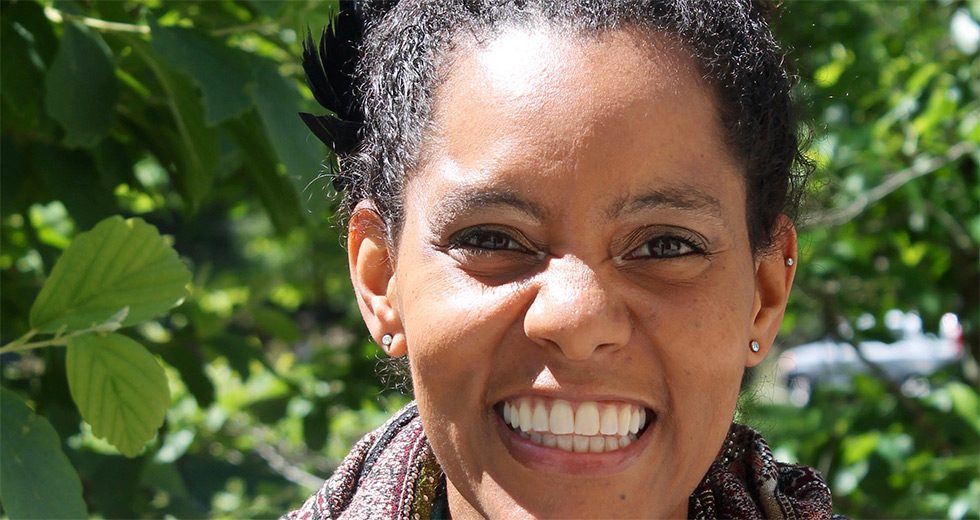
Profile: Sabrina Slater
The World Communion of Reformed Churches is particularly committed to gender justice and the just and full participation of women in all areas of church and society. The 2017 General Assembly adopted “The Declaration of Faith on the Ordination of Women” and pledged to journey with those members who do not yet ordain women. The ordination of women is not just about having more women in the ministry; rather it’s about recognizing that including women in ministry and as equals in church leadership will create a powerful force for social and economic justice throughout the world. This is one in a series of articles on women in ministry highlighting these beliefs.
“Who are we to get in the way in the movement of the Holy Spirit?”
“I feel very blessed to get to live the life I live. If I were in a different geographical context, if I had grown up in a different denomination, if I had grown up in a different time—even if I had been born into a different family—I would likely not be able to live the life that I am living right now. I would not be able to be a pastor of a congregation where I am the age of many of their children or grandchildren perhaps and be welcomed,” said Sabrina Slater, a pastor in the Presbyterian Church (USA).
Slater, currently serving a church in New York state, shared that she did not grow up thinking she would become a minister. Neither of her parents are ministers, but she grew up in a family that took faith very seriously. She has a degree in cognitive science with a minor in health and human development, and while working in student services at a university she obtained a Masters of Education.
Working at the university Slater had the opportunity to blend her work and faith life by helping to take some students to Kenya and look at HIV and AIDS in sub-Saharan Africa.
“I was able to take students to the context they were not familiar with at all and engage with them as they experienced poverty and some realities they were not used to—and process those conversations with them. We worked with an organization called Christian Women Works of Charity, which is really one woman’s heart,” said Slater.
Intersecting her work with faith she went on an adult mission trip and had the opportunity to serve briefly with Mercy Ships, an international charity organization that provides humanitarian aid.
“Through those experiences I felt God tugging a bit for me to be not just in higher education but to do something new, and I didn’t necessarily know what. But I happened to be working at a church that had a woman pastor who looked a bit like me, and I agreed with her theology, and it was from that I learnt about the Master of Divinity degree, which I had never heard about. And I thought it would be fantastic: you can just study about God in a university,” shared Slater.
Keeping in prayer her calling she took on this journey. “I didn’t desire it, but I did think and pray about it. And as much as I was not interested in taking Greek or Hebrew, I figured if we say yes to God and where God is leading us that would be a right response,” said Slater.
As a student at Princeton Theological Seminary she had the opportunity to travel and have different experiences, hearing a variety of voices, including in Israel and Palestine, Cuba, Brazil, India and South Africa, along with the courses she was taking.
Once she accepted God’s call, her journey to becoming a minister was a smooth, and she now is a pastor at Christ the King Fellowship, Presbyterian Church, for the last 11 months.
Having the opportunity to study with people from different denominations and cultural contexts it was eye opening for Slater to hear the reasoning for why women can and cannot be ordained. According to her it is located differently depending on which denomination you belong to.
“We have to be aware of the conversation and how it is being held in order to engage in it, and our points of reference are different depending which church family we are coming from. It is a useful point of reference to not have the conversation about ordination as something as a right because not everyone is called to be ordained. That pastoral role we are discussing here is not everyone is called to be a pastor. God might and does call anyone who is being baptized, and that is an invitation to all. So, who are we to get in the way in the movement of the Holy Spirit?” said Slater.
When asked what message she has for women facing challenges on their journey to being a minister she said, “To all the women facing challenges on their way, God sees you, God loves you and God has given you everything you need to be a blessing in your context in this world. Your voice is important and necessary and if there is not a space for you at the Communion table at the Eucharist then there is not a space for any of us. Women are enough, and it is not a little thing that it would be a woman through which Jesus Christ would come to us. For God to have flesh on comes through the womb of a woman; that is powerful.”
 World Communion of Reformed Churches
World Communion of Reformed Churches